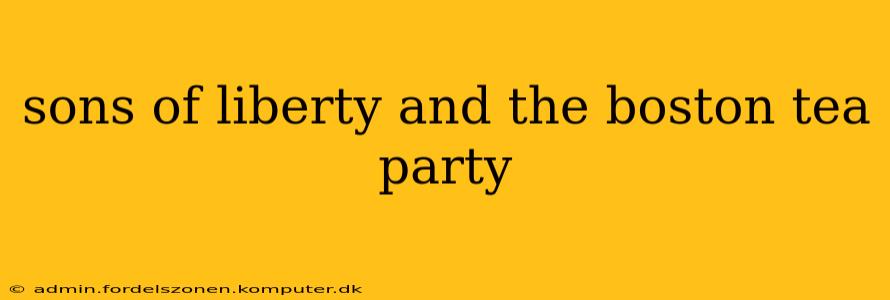The Boston Tea Party, a pivotal event in the lead-up to the American Revolution, wouldn't have been possible without the Sons of Liberty. This clandestine organization, composed of colonial patriots, played a crucial role in organizing and executing this daring act of defiance against British rule. Understanding their intertwined history is key to comprehending the origins of the American fight for independence.
Who Were the Sons of Liberty?
The Sons of Liberty emerged in the 1760s as a response to escalating tensions between Great Britain and its American colonies. Fueled by resentment over unfair taxation without representation, these groups were initially formed in various colonies, with the most prominent chapter operating in Boston. Their membership spanned diverse social classes, uniting merchants, artisans, laborers, and even some wealthy elites who shared a common goal: resisting British policies they deemed oppressive.
While the precise membership lists remain elusive, key figures like Samuel Adams, John Hancock, and Paul Revere are widely recognized as leaders within the Boston chapter. Their organizational structure was relatively loose, relying on networks of communication and shared purpose rather than a rigid hierarchy. They employed a range of tactics, from public protests and boycotts to more covert operations.
The Boston Tea Party: A Coordinated Act of Defiance
The Boston Tea Party, occurring on December 16, 1773, was the culmination of years of growing frustration with British policies, particularly the Tea Act of 1773. The Sons of Liberty saw this act, which granted the East India Company a monopoly on tea sales in the colonies, as a blatant attempt to circumvent colonial resistance and impose taxation without consent.
The event itself was meticulously planned. Disguised as Mohawk Indians, members of the Sons of Liberty boarded three British ships in Boston Harbor and dumped 342 chests of tea into the water. This dramatic act of defiance was not spontaneous; it was a carefully orchestrated demonstration designed to send a powerful message to the British government.
What was the purpose of the Boston Tea Party?
The primary purpose was to directly challenge the Tea Act and, by extension, the broader principle of taxation without representation. The Sons of Liberty aimed to demonstrate colonial resolve and pressure the British government to reconsider its policies. The act was a calculated risk, intended to push the boundaries of protest and galvanize further resistance throughout the colonies. It was a statement that the colonies were not willing to passively accept oppressive measures.
What were the consequences of the Boston Tea Party?
The Boston Tea Party enraged the British government. In response, the Intolerable Acts were passed, designed to punish Massachusetts and assert greater control over the colonies. These acts further fueled colonial resentment and pushed the colonies closer to armed rebellion. The event is widely viewed as a pivotal moment that irreversibly altered the relationship between Great Britain and its American colonies, ultimately leading to the outbreak of the American Revolutionary War.
How did the Sons of Liberty organize the Boston Tea Party?
The Sons of Liberty’s organizational prowess was crucial. They utilized existing networks, established through years of coordinating boycotts and protests. Secret meetings, coded messages, and carefully chosen participants ensured secrecy and coordination. Their ability to mobilize a significant number of people, effectively disguise them, and execute the plan without significant violence or bloodshed speaks to their organizational skills and strategic planning.
Were the Sons of Liberty a violent group?
While the Boston Tea Party might seem like an act of violence, the Sons of Liberty generally avoided direct physical confrontation. Their methods were primarily focused on non-violent resistance, utilizing boycotts, protests, and acts of civil disobedience. However, their actions were undeniably provocative and challenged the authority of the British government, indirectly escalating tensions and contributing to the growing conflict.
In conclusion, the Sons of Liberty and the Boston Tea Party are inextricably linked. The organization's meticulous planning and unwavering commitment to resisting British oppression were instrumental in carrying out this iconic act of defiance, a pivotal moment that ignited the flames of the American Revolution. Their story underscores the power of organized resistance and the crucial role of citizen action in shaping the course of history.
